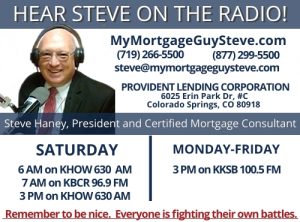Should My Mom and Dad Get a Reverse Mortgage?
You are referred to as the “Sandwich Generation.” You’ve got kids in, or heading for, college as well as aging parents. Wherever you look, all you can see is additional expenses.
In the rough economy of the past few years–with home values and retirement savings down, government benefit programs threatened and people living longer–many adults are concerned about their parents being able to finance the remainder of their lives, even if they have been diligent about retirement planning.
The vast majority of older Americans have their wealth tied up in their home equity. If your parents struggle to pay monthly bills or cover healthcare expenses, then tapping into that equity may be the best solution. A reverse mortgages is a financial product that allows them to do just that.
Whether or not a reverse mortgage is the right financial option for your parents is a very personal decision and based on many factors. In most cases, your parents will discuss this option with you before making their decision. You want to be prepared to give them the best advice. Here are some questions you most likely will want answered:
What is a reverse mortgage?
A reverse mortgage is a loan available to homeowners over 62 years of age that enables them to convert part of the equity in their home into cash.
The loan is called a reverse mortgage because the traditional mortgage payback stream is reversed. Instead of making monthly payments to a lender (as with a traditional mortgage), the lender makes payments to the borrower.
What do people use reverse mortgages for?
Reverse mortgages were conceived as a means to help people in or near retirement use the money they have put into their home to pay off debts (including traditional mortgages), cover basic monthly living expenses or pay for healthcare. There is no restriction on how a borrower may use their reverse mortgage proceeds.
Will a reverse mortgage increase my parents’ monthly expenses?
No. Borrowers are not required to pay back the loan until the home is sold or otherwise vacated. As long as they live in the home, they are not required to make any monthly payments towards the loan balance, but they must remain current on property taxes and homeowners insurance.
If my parents take a reverse mortgage, does the bank then own their home?
No. With a reverse mortgage, the borrower always retains title to or ownership of the home. The lender never, at any point, owns the home even after the last surviving spouse permanently vacates the property.
How much money can my parents expect?
The amount of funds they are eligible for depends on the age of the youngest parent, the value of the home, the interest rate and upfront costs. The older a person is, the more proceeds he or she can receive.
Funds can be delivered as a lump sum, as a line of credit or as fixed monthly payments, either for a specified period of time or for as long as your parents live in the home. They can also use more than one of these options, for example, take part of the proceeds as a lump sum and leave the balance in a line of credit.
How much will the loan cost my parents?
Loan fees can be paid out of the loan proceeds. This means a borrower incurs very little out-of-pocket expense to get a reverse mortgage. The only out-of-pocket expenses are the appraisal and possibly the counseling session (depending on which counseling agency they work with), which together total a few hundred dollars.
When the loan is eventually paid off, the balance equals the amount borrowed, plus interest and mortgage insurance. The loan balance grows as the borrower continues to live in the home. In other words, when the borrower sells or leaves the house, he or she will owe more than originally borrowed. Look at it this way: A traditional mortgage is a balloon full of air that loses some air and gets smaller each time a payment is made.. A reverse mortgage is an empty balloon that grows larger as time passes.
If when my parents move or die and the balance is more than the value of the home, am I then responsible?
No matter how large the loan balance, your parents (or their heirs) will never have to pay more than the appraised value of the home or the sale price. This feature is referred to as non-recourse. If the loan balance exceeds the appraised value of the home, then the FHA insurance fund absorbs that loss. The government pays for it with proceeds from its insurance fund, which the borrower pays into at closing and on a monthly basis.
If my parents get a reverse mortgage, what are their responsibilities?
Primary lien: A reverse mortgage must be the primary lien on a home. Any prior mortgage must be paid in full to acquire the reverse mortgage. (Reverse mortgage proceeds can be used for this purpose,)
Occupancy requirements: The property used as collateral for the reverse mortgage must be your parents’ primary residence.
Taxes and Insurance: Your parents are required to remain current on their real estate taxes, home insurance, and, if applicable, condo fees or they are susceptible to default.
Property Condition: Your parents are responsible for completing mandatory repairs and maintaining the condition of their property.
Rights of Non-Borrower Residents at Time of Loan Termination: If there is a non-borrower resident living in the home who is not on title, it’s important that they understand what happens when the owner on title permanently vacates the property, either by death or move out, and the loan becomes due and payable. It’s important that these issues be discussed with a reverse mortgage loan officer prior to the loan closing. In the case of a couple, if one spouse is under 62, it may be possible for that person to continue living in the home after the older spouse passes away, as long as certain conditions are met.
If a disabled son or daughter is living at home, and the parents get a reverse mortgage, that son or daughter may have to look for alternative housing options once the loan becomes due and payable, unless other arrangements are made ahead of time to pay off the reverse mortgage.
But my parents want to downsize. How can a reverse mortgage help them?
While the typical retiree uses a reverse mortgage to eliminate debts, pay for healthcare and/or cover daily living expenses, a growing segment of the senior population is using it to purchase a home that better suits their needs.
The advantage of using what is known as a HECM for Purchase is that the new home is purchased outright, using funds from the sale of the old home, private savings, gift money and other sources of income, which are then combined with the reverse mortgage proceeds. This home buying process leaves the homeowner with no monthly mortgage payments.
How do my parents learn enough about reverse mortgages to make an informed evaluation and decision?
Are you concerned that your parents need help in their retirement? Find out how a reverse mortgage could help you help them. Call Steve Haney, The Mortgage Doctor, today at: (719) 266-5500. He will sit with you and determine if a reverse mortgage could help make your retirement a little less stressful.
A reverse mortgage can eliminate their monthly mortgage payment and even give them cash every month. This can allow them to be able to visit the grandchildren, take a vacation, or take up a new hobby. If your parents may not have enough money to enjoy their retirement, consider telling them about a reverse mortgage!











